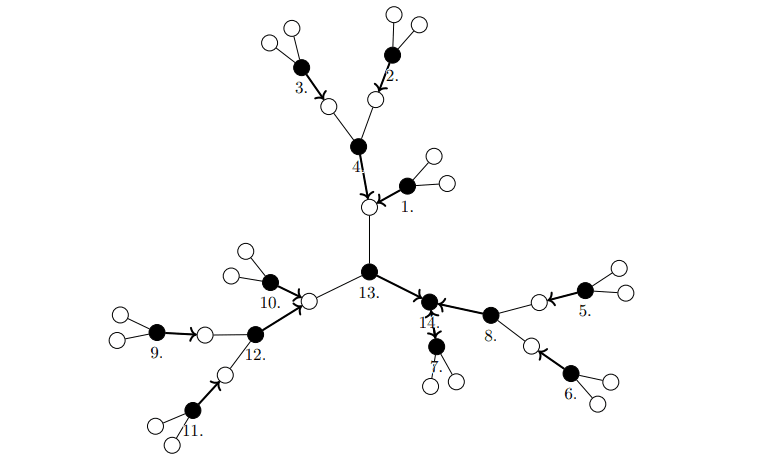The longstanding Lovász local lemma presents a fundamental challenge in distributed computing, and recent progress has intensified interest in its complexities. Sebastian Brandt and Tim Göttlicher, from CISPA Helmholtz Center for Information Security and Saarland University, now demonstrate a significant advancement by establishing a firm lower bound for solving the distributed Lovász local lemma. Their work achieves this breakthrough specifically within the challenging -LOCAL model, and notably, extends to the even more restrictive randomized online-LOCAL model using a well-studied case known as sinkless orientation. This research delivers the first superconstant lower bound for both sinkless orientation and the broader distributed Lovász local lemma across multiple computational models, directly addressing key open questions in the field and introducing a novel technique with the potential to unlock further progress in proving computational limits.
Researchers achieved this by focusing on sinkless orientation, a specific instance of the LLL, and demonstrating the bound holds even within a stronger computational model than the standard -LOCAL model. This result extends to a variety of other related models, providing the first superconstant lower bound for both sinkless orientation and the broader LLL problem across these systems. To achieve this breakthrough, scientists developed a novel lower bound technique, potentially establishing a new, generic approach for proving computational limits for problems studied within the context of locality.
The research leverages the randomized online-LOCAL model, where each computational node, representing a vertex in a graph, exchanges messages with its neighbors over synchronous rounds. Each node sends arbitrarily large messages and receives responses, performing unbounded internal computation based on accumulated information. Nodes operate without initial knowledge of the overall graph structure, relying only on their degree, uniquely assigned port numbers for incident edges, and the total number of nodes. In the randomized version of this model, each node is equipped with a private, unbounded-length random bit string, influencing its computational process. The study rigorously defines the complexity of an algorithm as the worst-case number of rounds required for all nodes to terminate, demanding that algorithms produce correct outputs with high probability, at least 1, 1/n, where n represents the number of nodes. Researchers also considered the quantum-LOCAL model, an enhancement of the randomized LOCAL model utilizing qubits for communication and quantum computation, demonstrating that the established lower bounds apply to both versions of the model.
Superconstant Lower Bound for Lovász Local Lemma
Scientists have achieved a groundbreaking lower bound for the complexity of the distributed Lovász local lemma (LLL) problem within the -LOCAL model of distributed computing. This result addresses long-standing open questions in the field and establishes a fundamental limit on the efficiency of algorithms designed to solve this challenging problem. The team demonstrated this lower bound specifically for the well-studied case of sinkless orientation, utilizing a stronger model than the standard -LOCAL, known as the randomized online-LOCAL model. This lower bound extends to a variety of other models studied across diverse research communities, solidifying its broad significance.
The work delivers the first superconstant lower bound for both sinkless orientation and the distributed LLL in all these models, representing a substantial advancement in understanding the inherent computational difficulty of these problems. Researchers measured this complexity using a novel lower bound technique, which they believe has the potential to become a generic tool for proving lower bounds for numerous important problems within the context of locality. The team’s approach involved analyzing the communication requirements of algorithms solving the LLL problem, establishing that any algorithm must perform at least rounds of communication in the worst case. This measurement confirms a fundamental limitation on the speed at which these problems can be solved in a distributed setting. Furthermore, the new technique developed in this study offers a promising pathway for establishing even stronger lower bounds in the future.
Lovász Lemma Complexity, A Fundamental Limit
This research establishes a fundamental limit on the complexity of solving the Lovász local lemma problem in distributed computing, demonstrating a lower bound for its computational difficulty. The team proves this limit applies even to a specific instance of the problem, known as sinkless orientation, and within a particularly restrictive computational model. This achievement represents the first demonstration of a superconstant lower bound for both sinkless orientation and the broader Lovász local lemma problem across several relevant computational models, resolving previously open questions in the field. The researchers developed a novel technique for proving these lower bounds, constructing a “construction tree” that encodes a sequence of operations leading to a specific computational outcome. While the current construction has limitations regarding the size of graphs it can handle, the team believes this technique holds promise as a general method for establishing stronger lower bounds for a range of important problems in distributed computing.

